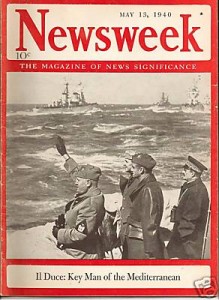Starting this week, the editor’s blog will feature an afternoon roundup of all things media from over the pond. From the hugely important to the very inconsequential, check in for a choice of America’s journalistic goings on.
A glimpse of a perfect media world
To the Chicago Tribune first today for a heartwarming paean to Dave Eggers and McSweeney’s, and to Eggers’ own heartwarming paean to the newspaper journalism of old.
Eggers is the founder of independent publishing house McSweeny’s, responsible for, among other things, Timothy McSweeney’s Quarterly Concern and McSweeney’s Internet Tendency.
Issue 33 of the McSweeney’s quarterly – “so immense it comes in a pillow-size silver, Ziploc-ish bag” – has just been released. It is safe to say that Tribune reporter Christopher Borrelli, who likens it to “a fantasy, a tantalizing mirage — a glimpse of a perfect media world”, is a fan.
The books section runs 96 pages, the Sunday magazine 112 pages. The photos are large and gorgeous, the longest story is about 20,000 words, the arts section is two sections, and, basically, it’s fun.
Really fun.
So perfectly executed that if you work at a daily newspaper — heck, if you merely prefer the feel of news on print, or just adore the beleaguered medium (as Eggers does) — issue No. 33 may bring a tear to your eye.
In interview with Borrelli, Eggers discusses the pragmatic (financial viability) and nostalgic (reading the newspaper as a child) elements of his relationship with the printed word. He also offers a decent response to the accusation that print journalism is elitist:
Readers can tell you what’s important to them by what they look at, but there’s a great danger in that too. When I see a picture of a funny dog wearing a hat on the Web, yeah, I click it too. The problem is that pretty soon you’re down a rabbit hole, and who’s still holding the government accountable? I would much rather have reporters who have been at a subject for a while tell me what’s most important about a subject. Am I really going to cobble together my own news of what’s happening in Afghanistan?
Truth be told, if all the good newspapers called it a day Eggers probably would cobble together his own news of what’s happening in Afghanistan, and it would probably be pretty good. But I suspect this one man publishing phenomenon is not a very good test case for the rest of us. With luck, the San Francisco Panorama – “a nod to Eggers’ adopted hometown and the locality of newspapers” according to Borrelli – which broke even on its first run, will make it into regular print.

Dave Eggers
A glimpse of the real media world
North to the New York Post now, which reports that formal experimentation doesn’t seem to be paying off so well for Newsweek. From Post reporter Keith J. Kelly:
Attempts by Newsweek CEO Tom Ascheim and Editor-in-Chief Jon Meacham to reshape the magazine into a lower-circulation weekly with a more Economist-like feel do not seem to be paying off.
Tucked in the fourth-quarter earnings report from parent Washington Post Company were numbers that suggest the magazine lost $28.1 million in 2009, the first year of the process.
Newsweek is one of only two magazines currently published by the Washington Post Company. The other, Arthur Frommer’s Budget Travel, lost $1.2 million bringing the magazine arm losses to a total of $29.3 million.
Politico commentator Michael Calderone was sceptical about the shake-up from the start. From early 2009:
It certainly is a big gamble to mess with the DNA of such an established brand. But given Newsweek’s losses — and the magazine industry as a whole — it’s not a bad time to try and switch things up.
Perhaps some new kind of gamble is now needed at the beginning of 2010, established brand or not.

The hyperlocal/local/niche debate: a follow-up
To, well, anywhere local now with Lost Remote, and a follow up to Wednesday’s US Digest story about local/hyperlocal/niche reporting.
What seemed at first like a fairly innocuous post by the site’s editor Steve Safran provoked a fair amount of discussion. Safran then returned to the fray with a follow up post to address some of the readers’ comments.

Last in: the last in
A little toward the trailing edge of technology, the Winnipeg Free Press, “whose dead-tree edition have been hemorrhaging readers for two decades”, is nonetheless deserving of a runners-up round of applause for finally catching the ‘tweet from local council meeting’ bandwagon.
Apparently, reporter Bartley Kives’ “irreverent tone is perfect for social media”.
Lest the improbably named Bartley Kives get carried away with fantasies of the Twitterati, Duncan McDonagle of Snoo.ws chimes in with a sharp reminder of the realities of modern local reporting in Winnipeg, to which the world’s best-named people clearly gravitate.
And poor old Kives still had to interview participants and write stories for the paper’s website and for the newsprint edition the next morning – as well as keep an eye on council’s debate about garbage containers.
Fear not though, Kives’ humour is very much intact, in evidence in his Twitter report that McDonagle had reported on his Twitter reporting:
Reporter tweets about journalism instructor blogging about reporter tweeting. http://tinyurl.com/yaytn3a #selfpromotion #wpgcouncil

Image of Dave Eggers courtesy of David Shankbone
Image of street map courtesy of Htonl



